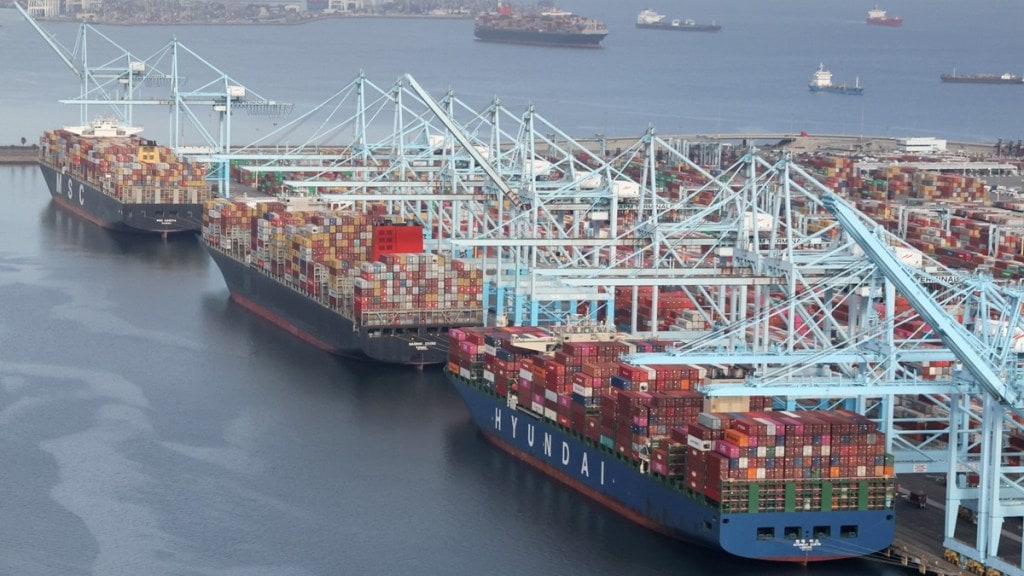– By Rajesh Mehta
Following the pandemic, there was a significant surge in demand, prompting major liners to invest in expanding their capacities. However, the tables have turned abruptly, dampening demand to the extent that economists fear a potential recession. Global geopolitical tensions are exacerbating the trade crisis, adding another layer of complexity to an already challenging situation.
Issues such as trade disputes, sanctions, and territorial conflicts are creating uncertainties and disruptions in global trade flows. With restricted access in areas like Russia, Ukraine, and the Red Sea, alongside low water levels in the Panama Canal, have further strained the already established supply chain trade lanes. The strained relations between major powers like the United States, China, and Russia have led to tariffs, export restrictions, and heightened security measures, all of which impact international shipping routes and trade agreements.
Moreover, regional conflicts, such as those in the Middle East and Eastern Europe, can directly affect key maritime chokepoints like the Red Sea and the Black Sea, further hindering the smooth movement of goods. These geopolitical tensions not only increase the risk of supply chain disruptions but also contribute to the overall atmosphere of uncertainty, making it challenging for businesses to plan and operate efficiently.
However, it is believed that every challenge makes us stronger. All we need is patience and perseverance to find the best solutions within our means. Let’s analyse the problem and look at possible alternatives. Based on recent studies and surveys, various strategies can be considered to address the challenges brought about by the crisis.
Air Cargo: Despite its suitability for urgent shipments, air cargo is considerably more expensive, typically costing 3-4 times more than ocean transport. This cost factor makes it less feasible for regular or bulk shipments but remains an indispensable option for time-sensitive goods.
Hybrid Transportation: The crisis has led to significant delays in transit, exacerbated by a shortage of shipping capacity and escalating sea freight rates. As a result, hybrid combinations that offer flexibility and resilience in the face of these challenges are becoming increasingly attractive to businesses seeking reliable transportation options. However, while innovative hybrid solutions like SEA-LAND or SEA-AIR AND LAND are being explored, they introduce their own complexities and risks, including the need for multiple cargo handling processes and potential disputes arising from damages or delays along the various transportation modes.
Alternative Routes: Shippers are actively investigating alternative sea-air routes, such as the route from China to Europe via Los Angeles, to circumvent the disruptions caused by the crisis. These alternative routes provide diversification and can mitigate risks associated with traditional shipping lanes that may be heavily impacted by geopolitical tensions or logistical bottlenecks.
Rail Transport: Rail transport has experienced a notable surge in usage, both independently and as part of sea-rail hybrid solutions. Notably, bookings for the China-Europe rail route have surged by 37% since the onset of the crisis, highlighting the growing significance of rail as a viable transportation option amidst the turmoil in maritime shipping.
India-Europe Trade Route: Contemplation is underway to leverage a sea-land route through the Middle East for India-Europe trade. However, this option introduces its own set of challenges, notably the necessity to destuff containers at Dammam before proceeding by road to Europe, which adds complexity and potential risks to the supply chain.
Furthermore, an often-overlooked consequence of the crisis is its impact on carbon emissions. The increased reliance on air cargo and longer transit distances are likely to pose challenges for shipping lines and their customers in meeting their carbon reduction targets in 2024, underscoring the environmental implications of the current transportation disruptions.
While many global manufacturers and retailers are currently weathering the crisis in the short term, prolonged disruptions could prompt a significant shift towards alternative modal choices. However, decisions regarding the adoption of more expensive yet expedited transport options via hybrid combinations will inevitably be influenced by the trade-off with additional inventory carrying costs resulting from shipping delays.
(Rajesh Mehta is the Executive Director of Liladhar Pasoo Group.)
(Disclaimer: Views expressed are personal and do not reflect the official position or policy of Financial Express Online. Reproducing this content without permission is prohibited.)

